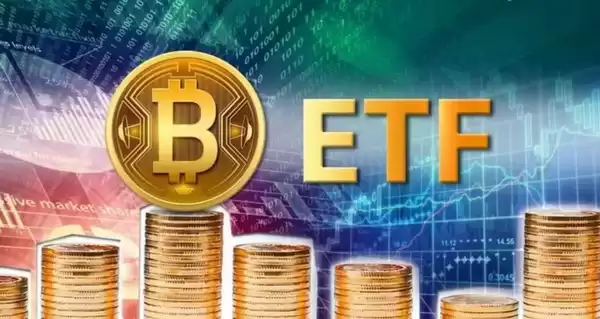-
 bitcoin
bitcoin $87959.907984 USD
1.34% -
 ethereum
ethereum $2920.497338 USD
3.04% -
 tether
tether $0.999775 USD
0.00% -
 xrp
xrp $2.237324 USD
8.12% -
 bnb
bnb $860.243768 USD
0.90% -
 solana
solana $138.089498 USD
5.43% -
 usd-coin
usd-coin $0.999807 USD
0.01% -
 tron
tron $0.272801 USD
-1.53% -
 dogecoin
dogecoin $0.150904 USD
2.96% -
 cardano
cardano $0.421635 USD
1.97% -
 hyperliquid
hyperliquid $32.152445 USD
2.23% -
 bitcoin-cash
bitcoin-cash $533.301069 USD
-1.94% -
 chainlink
chainlink $12.953417 USD
2.68% -
 unus-sed-leo
unus-sed-leo $9.535951 USD
0.73% -
 zcash
zcash $521.483386 USD
-2.87%
does bitcoin etf track bitcoin
Bitcoin exchange-traded funds (ETFs) offer investors exposure to the cryptocurrency's price without the need for direct ownership or trading on exchanges.
Oct 23, 2024 at 03:18 am

Bitcoin exchange-traded funds (ETFs) are investment vehicles that track the price of Bitcoin. They offer investors exposure to the cryptocurrency without the need for direct ownership or trading on exchanges.
2. Tracking MechanismBitcoin ETFs typically track the spot price of Bitcoin, which is the real-time market value of the cryptocurrency. The ETF's share price is linked to the spot price and typically updates throughout the trading day.
3. Tracking AccuracyThe tracking accuracy of Bitcoin ETFs varies depending on the underlying tracking mechanism. Some ETFs use a physical tracking method, where they hold physical Bitcoin as collateral. Others use a synthetic tracking method, which involves using futures contracts.
4. Factors Affecting TrackingSeveral factors can affect the tracking accuracy of Bitcoin ETFs:
- Premiums or Discounts: ETF shares can trade at a premium or discount to the spot price due to supply and demand imbalances.
- Market Volatility: Bitcoin's high volatility can lead to price discrepancies between the ETF and the underlying asset.
- Custodianship: The custody and security of the underlying Bitcoin are crucial for tracking accuracy.
Bitcoin ETFs provide a convenient and accessible way for investors to gain exposure to Bitcoin without direct ownership. However, it's important to understand the tracking mechanism and factors affecting tracking accuracy before investing in these ETFs.
Disclaimer:info@kdj.com
The information provided is not trading advice. kdj.com does not assume any responsibility for any investments made based on the information provided in this article. Cryptocurrencies are highly volatile and it is highly recommended that you invest with caution after thorough research!
If you believe that the content used on this website infringes your copyright, please contact us immediately (info@kdj.com) and we will delete it promptly.
- Work Dogs Unleashes TGE Launch, Sets Sights on Mid-2026 Listing & Ambitious $25 Token Target
- 2026-01-31 15:50:02
- WD Coin's TGE Launch Ignites Excitement: A Billion Tokens Set to Hit the Market
- 2026-01-31 16:10:02
- Royal Mint Launches Interactive £5 Coin for a Thrilling Code-Breaker Challenge
- 2026-01-31 16:10:02
- Crypto, AI, and Gains: Navigating the Next Wave of Digital Assets
- 2026-01-31 15:50:02
- Coin Nerds Forges Trust in the Digital Asset Trading Platform Landscape Amidst Evolving Market
- 2026-01-31 16:05:01
- Blockchains, Crypto Tokens, Launching: Enterprise Solutions & Real Utility Steal the Spotlight
- 2026-01-31 12:30:02
Related knowledge

How to get started with Bitcoin ETF investing with just $100?
Jan 22,2026 at 08:59pm
Understanding Bitcoin ETF Basics1. A Bitcoin ETF is a financial instrument traded on stock exchanges that tracks the price of Bitcoin without requirin...

What is the minimum amount you need to invest in a Bitcoin ETF?
Jan 18,2026 at 08:20am
Bitcoin ETF Investment Thresholds1. Bitcoin ETFs trade on traditional stock exchanges, meaning investors purchase shares just like any other publicly ...

How do I protect my Bitcoin ETF from market volatility?
Jan 18,2026 at 12:20pm
Understanding Bitcoin ETF Structure1. Bitcoin ETFs hold bitcoin or bitcoin futures contracts rather than the underlying asset directly, introducing st...

How to transfer your GBTC shares to a lower-cost Bitcoin ETF?
Jan 23,2026 at 04:20am
Understanding GBTC Share Conversion Mechanics1. Grayscale Bitcoin Trust (GBTC) operates as a closed-end fund, meaning its shares trade on the open mar...

What is the best time of day to buy or sell a Bitcoin ETF?
Jan 20,2026 at 02:39am
Market Hours and Liquidity Patterns1. Bitcoin ETFs trade on traditional stock exchanges like the NYSE and Nasdaq, which operate during standard U.S. m...

How to buy the ARK 21Shares Bitcoin ETF (ARKB)?
Jan 25,2026 at 10:39pm
Understanding ARKB Structure and Availability1. ARKB is a spot Bitcoin exchange-traded fund launched by ARK Invest and 21Shares in the United States. ...

How to get started with Bitcoin ETF investing with just $100?
Jan 22,2026 at 08:59pm
Understanding Bitcoin ETF Basics1. A Bitcoin ETF is a financial instrument traded on stock exchanges that tracks the price of Bitcoin without requirin...

What is the minimum amount you need to invest in a Bitcoin ETF?
Jan 18,2026 at 08:20am
Bitcoin ETF Investment Thresholds1. Bitcoin ETFs trade on traditional stock exchanges, meaning investors purchase shares just like any other publicly ...

How do I protect my Bitcoin ETF from market volatility?
Jan 18,2026 at 12:20pm
Understanding Bitcoin ETF Structure1. Bitcoin ETFs hold bitcoin or bitcoin futures contracts rather than the underlying asset directly, introducing st...

How to transfer your GBTC shares to a lower-cost Bitcoin ETF?
Jan 23,2026 at 04:20am
Understanding GBTC Share Conversion Mechanics1. Grayscale Bitcoin Trust (GBTC) operates as a closed-end fund, meaning its shares trade on the open mar...

What is the best time of day to buy or sell a Bitcoin ETF?
Jan 20,2026 at 02:39am
Market Hours and Liquidity Patterns1. Bitcoin ETFs trade on traditional stock exchanges like the NYSE and Nasdaq, which operate during standard U.S. m...

How to buy the ARK 21Shares Bitcoin ETF (ARKB)?
Jan 25,2026 at 10:39pm
Understanding ARKB Structure and Availability1. ARKB is a spot Bitcoin exchange-traded fund launched by ARK Invest and 21Shares in the United States. ...
See all articles





















![Ultra Paracosm by IlIRuLaSIlI [3 coin] | Easy demon | Geometry dash Ultra Paracosm by IlIRuLaSIlI [3 coin] | Easy demon | Geometry dash](/uploads/2026/01/31/cryptocurrencies-news/videos/origin_697d592372464_image_500_375.webp)




















































